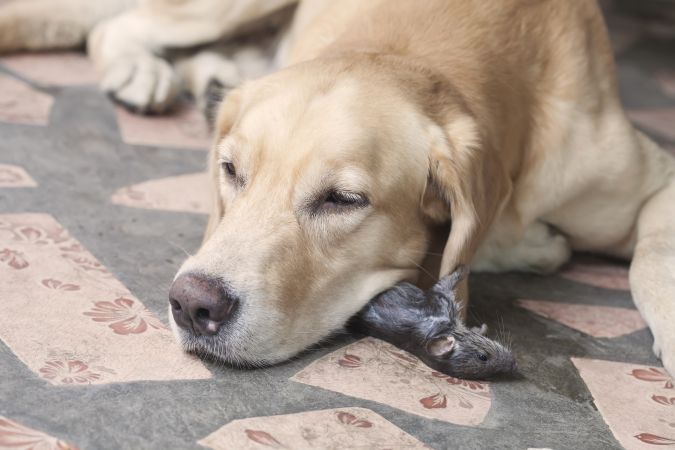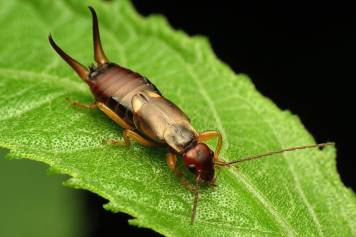Dogs are sometimes attracted to dead things, such as dead rats. Why? No one knows for sure. It may be out of curiosity or a dog may be hungry, amongst other reasons. But what happens if a dog licks a dead rat?
Connect with a verified veterinarian in minutes. Licensed vets are available 24/7 to answer your questions. No need to worry about your furry family member.
Has your dog licked a dead rat? Are you worried the dead rat could make your dog sick? If so, then you’ve come to the right place. We understand it can be scary when your dog does something like this.
In this article, we’ll take a look at dead rats and whether or not they can make a dog sick. Let’s get started!

What are Rats?
Rats are rodents that are larger than a mouse. There are over 60 species of rat found all around the world. And they come in various sizes. There are rats that are about five inches long, while some rats can be as large as a cat!
Rats are usually nocturnal, which means they’re more active at night. This is when they look for food, mate, and take care of their pups. A couple of rats can soon lead to several hundred rats! Some rats can have up to 22 pups at a time. However, most rats have about six pups in a batch. What’s more, they tend to live in packs.
Rats are omnivores, which means they eat protein (meat), as well as plants. They also eat grain, insects, and other animals (such as snails, small birds, and even reptiles).
When they’re alive, rats can be dangerous to dogs; however, what happens if a dog licks a dead rat?
Dead Rats & Dogs
If your dog licks a dead rat, chances are he will be OK. However, there are instances where a dead rat could make a dog sick.
Rats can carry a parasite called toxoplasma. This can cause an infection in the dog, with symptoms that include diarrhea, pneumonia, liver disease, and more. What’s more, rats may also be infected with other organisms such as parasites, bacteria, and more.
And if the dead rat was poisoned, it’s possible the dog could also ingest the poison. However, this usually doesn’t happen if your dog has just licked the outside of the rat. If the dog eats the rat, or the rat had open wounds, then it’s possible that the dog could be exposed to the poison that killed the rat.

Review symptoms, medications & behavior to keep your pets healthy with a Vet Online in just minutes.
Ask a Vet Live NowWhat to Do If Your Dog Licks a Dead Rat
Most of the time, your dog should be just fine. However, it’s important to monitor your dog for any symptoms that indicate he’s sick. The symptoms are too many to list here. So, if your dog has licked a rat recently and becomes sick, then call the vet right away. Let the vet know what’s happened and explain your dog’s symptoms. This will help the vet decide the best course of action for your dog.
Connect with a verified veterinarian in minutes. Licensed vets are available 24/7 to answer your questions. No need to worry about your furry family member.

Gemma Cliffin BSC BVSC MRCVS
This article has been reviewed and approved by an independent Veterinarian: Dr Gemma Cliffin MRCVS is an experienced small animal vet who combines her love of writing alongside working in practice. Since her graduation from the University of Liverpool in 2014 she has worked in a wide variety of roles including first opinion practice, as a night vet and as a locum vet. She has also spent time working at a charity clinic in the Cook Islands which was a challenge but also immensely rewarding. She loves all aspects of veterinary work, but she especially enjoys medicine cases and diagnostic imaging. She is passionate about pain-management, particularly in her more senior patients. She currently works in a first opinion small animal practice in North Yorkshire where she deals with both routine and emergency cases.
Review symptoms, medications & behavior to keep your pets healthy with a Vet Online in just minutes.
Ask a Vet Live Now





